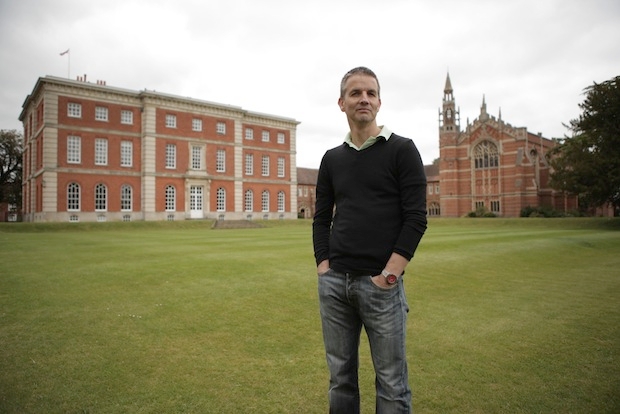‘Life is what happens to you while you’re busy making other plans,’ said John Lennon. Quite apposite from a man who — presumably — meant to spend a ripe old age staging increasingly embarrassing art happenings with Yoko Ono, rather than be shot dead by a nutcase. It also applies to the two things that most grabbed me on TV this week: A Very English Education (BBC2, Sunday) and the Red Wedding episode of Game of Thrones (available via Blinkbox).
The first, a follow up to Public School — the BBC’s 1979 fly-on-the-wall series about Radley — sought to find out what had become of its various stars. One of them, Rupert Gather, is now a very successful fund manager. Rupert is an old friend from way back. But though I knew he had served in tanks in the first Gulf war, I hadn’t been aware of his appearance in Public School as a sweetly bumptious 17-year-old filmed boasting about his plans to read English at Balliol. Becoming an Oxbridge reject is a hard thing for anyone at that age. (I was all ready to top myself.) Imagine, though, how doubly awful it must be actually to have a film crew there as you open your results letter, and to have the failure of your ambitions broadcast both to all your school mates and to every single PLU household in the land!
As you’d expect from the BBC, filmmaker Hannah Berryman’s implied subtext at every turn was: ‘They don’t half **** you up, those elitist, emotionally straitened, unnatural, all-boys private schools.’ Actually, though, from Rupert’s story I got quite the opposite message. Without that ‘sense of entitlement’ — which is really just a loaded, lefty chipster’s way of putting down someone who is ambitious and conscious of their worth — how are you going to have the drive to overcome all the obstacles that stand in the way of getting what you want?
At the end, Rupert was asked whether it was ‘unfair’ that boys from schools like Radley got so many of the best jobs. No, he said, turning it round rather deftly: the true villains are all those state schools whose poverty of aspiration prevents them from embracing the values and standards that serve privately educated children so well.
This was a touching, thoughtful, nuanced documentary with some nice twists. Paige — the spoilt playboy filmed in the original series turning up flashily (and illicitly) in his own car to get off with girls at the school disco — seemed a dead cert to become a particularly noisome hedge-fund manager. Instead, he followed his heart and is now a theatre director in Western Australia, where he earns so little he could never afford private fees. His parents, he admitted, would have considered this a mark of failure.
I’m sorry to have caught up so late with season three of Game of Thrones — and for those who still haven’t done so, I must now issue a spoiler alert: if you haven’t seen it yet DO NOT READ ON.
Those who have seen it will know why I can’t resist writing about it. The Red Wedding scene must surely rank among the most memorable episodes in TV history, right up there with the shooting of JR and the last scene of the Sopranos and the day when global warming comes to South Park.
It sticks out because it’s so utterly unexpected. For weeks — several quite boring weeks: GOT3 can be awfully slow in places — we have been enduring the slushy romance of Robb Stark and his pretty, somewhat do-goodish bride Talisa, now happily pregnant with an heir they plan to name after his heroic late grandfather Eddard. Simultaneously, a parallel storyline has teased us with the rapprochement between Robb and his estranged mother Lady Catelyn. With the help of her earthy wisdom, we are led to believe, the Starks will be unstoppable and the Kingdom of the North will be theirs once more.
Unfortunately, they have reckoned without the malignity of the otherwise inconsequential Lord Walder Frey, whom they once trivially slighted. At a lavish banquet of apparent reconciliation — in which Robb’s noblest bannerman Edmure Tully is married off, sight unseen, to one of Frey’s daughters — all at first seems well. No, better than well, for contrary to our expectation, shared by Edmure, that the girl will prove a hideous hag she turns out to be the most gorgeous looker. We’re happy, Edmure’s very happy, and there’s even a hint that Lady Catelyn might have found a new admirer to replace her cruelly executed husband…
…When suddenly out come the knives and crossbows, and every last member of the Stark family and retinue is savagely murdered. ‘Wow!’ you go. ‘Did I really see what I thought I just saw?’ It’s so shocking, you want to rewind to double check. This almost never happens in fiction: if you can’t rely on your main characters to survive, you can’t rely on anything. Which, of course, is author George R.R. Martin’s point and I like his point. As flies to wanton boys are we to the gods. They kill us for their sport.







Comments